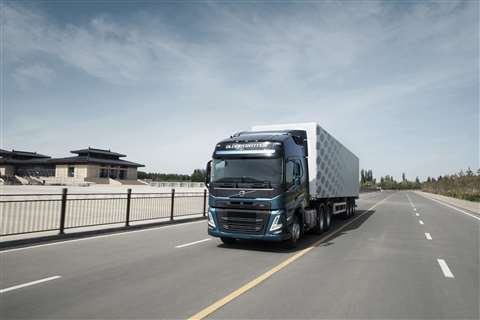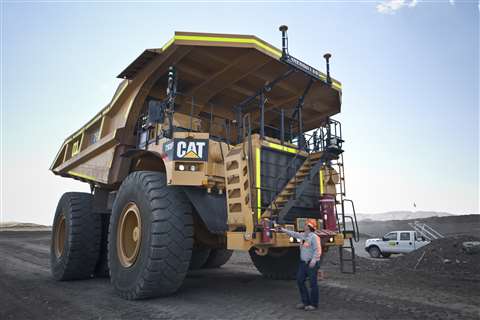7 ways construction is tackling sustainability
28 September 2021
As the impact of climate change and the need for sustainability becomes more apparent across the globe, many firms are launching new proposals to meet these growing demands.
While different challenges and goals exist for different sections of the industry, the race is on. But for construction to boost sustainability, all sectors will have to be on board, from contractors through to OEMs.
We take a look at recent key industry initiatives...

Volvo’s road to a greener future
Volvo Construction Equipment (Volvo CE) has a commitment to reach net zero value chain greenhouse gas emissions by 2040. Developing battery electric vehicles and fuel cell electric technology will go a long way to deliver on that ambition, but the firm has acknowledged that there is much more to do to drive industry change.
The company has set out four key strategies: Get everyone on the carbon reduction pathway, take action across the supply chain with a circular approach, Leverage the power of partnerships and Use data to deliver on sustainability goals.

Jacobs Engineering Group ramps up education
Alongside its comprehensive PlanBeyond 2.0 strategy, the US-based firm is offering its entire workforce the opportunity to take the Climate Solutions Accelerator course, a 90-minute online program that focuses on need-to-know information while outlining key solutions to respond to climate change.
The course helps to explain how everyone and every organisation can play a role to reduce emissions and informs businesses and organisations on how they can plan better and predict future trends and legislation.
“Effectively responding to the threat of climate change requires all of us to work together – businesses, governments and communities around the world,” said Jacobs Chair and CEO Steve Demetriou.
“Our shareholders are becoming increasingly focused on Environmental, Social and Governance (ESG) transparency. Our clients are talking to us every day about how to decarbonise their businesses and move towards meeting national industry targets.”

Skanska sets new targets
Swedish construction giant is now also targeting 70% carbon emissions reduction by 2030.
The Swedish construction giant previously set a goal of a 50% reduction, measured against its own 2015 levels.
Skanska said the ambitious update was in part a response to a recent report from the Intergovernmental Panel on Climate Change (IPCC) which said an increase in the pace of carbon emissions reduction was urgently needed.
The company added that it was also in a position to move forward with the new target, having already successfully achieved a reduction of 40% within its own operations, while simultaneously seeing revenues increase across the group.

Caterpillar’s Zero Emissions goal
The world’s biggest construction and mining OEM, Caterpillar, has signed a Memorandum of Understanding with global mining group Rio Tinto for the development of zero emissions autonomous haul trucks.
Rio Tinto and Caterpillar will progress a series of development milestones to include a 793 prototype pilot program, including testing and pre-production trials.
It is anticipated that the world’s first operational deployment of 35 new Caterpillar 793 zero-emissions autonomous haul trucks will be at Gudai-Darri once development is complete. Gudai-Darri is Rio Tinto’s most technically advanced iron ore mine, located in Western Australia.
The firm has also announced a partnership agreement with resource company BHP to develop and deploy zero-emissions mining trucks at BHP sites to reduce operational greenhouse gas (GHG) emissions.
Australia-based BHP is one of the world’s largest resource companies and extracts and process minerals, oil and gas.

Metso Outotec’s reduction plan
As discussed in our latest look at wider sustainability in construction, Finnish company Metso Outotec revealed its work to increase efficiency and reduce waste.
Metso Outotec provides technology and services for mining, aggregates, recycling and metal refining industries and main goal is to reduce waste, find new ways to use waste that has accumulated over many years and reuse what is available today.
The company is also looking at limiting transport – making direct point to point deliveries rather than transporting to storage centres.

Balfour Beatty’s Net Zero goal
Global infrastructure group Balfour Beatty this week launched the first in a series of innovative solutions and learnings to support the construction and infrastructure industry in reaching Net Zero Carbon emissions.
Building on its 55% carbon emissions reduction since 2010 and its recent commitment to the United Nations Race To Zero campaign, the company is also gearing up for its official submission to the Science Based Target Initiative.
To kickstart its countdown to COP26, the firm has partnered with the Supply Chain Sustainability School to undertake a joint survey targeting nearly 40,000 of the construction and infrastructure industry’s supply chain partners, to understand the barriers, issues and opportunities faced by the sector in achieving Net Zero.
Over the coming weeks, Balfour Beatty will demonstrate a wide range of innovative activities that support the bold international targets and ambitions set out in its sustainability strategy, “Building New Futures”.

Aecom’s objectives
In April, the firm announced the launch of Sustainable Legacies, its strategy for reaching ambitious environmental, social and governance (ESG) objectives.
The strategy integrates four key pillars that will embed sustainable development and resilience across the company’s work, improve social outcomes for communities, achieve net-zero carbon emissions and enhance governance.
The plan hopes to achieve net-zero carbon emissions, while developing and implementing best practices and achievable goals for its clients,
Aecom has furthered its own carbon emissions goals by ensuring that the company will be operationally net-zero by the end of this year. It has also committed to reach science-based net-zero carbon emissions by 2030 through the following actions:
- Setting new 1.5°C-aligned emissions reduction targets.
- Decarbonizing fleet vehicles and switching to renewable energy tariffs.
- Partnering with its suppliers to decarbonize and including carbon considerations into its procurement processes.
- Implementing a 50% reduction in business travel.
- Creating projects centred around using nature-based solutions to offset residual carbon.
For more on how sustainability is shaping the industry going forward, click here.


